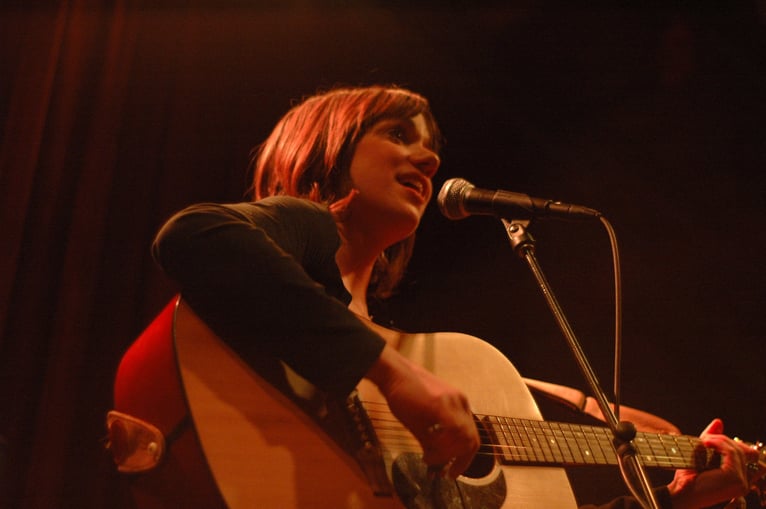
Andrea Sorum is the coordinator of chapel and music at United, where she has worked since 2017. Andrea is also a composer, songwriter and poet. Recently, she has decided to enroll at United, where she will be studying Theology and the Arts. Indeed, Andrea is about to conclude her first class at United, EL250: Introduction to Personal and Spiritual Formation with instructor Sara Wilhelm Garbers. In light of her decision to enroll as a student and that April is National Poetry Month, I sat down with Andrea to discuss how she intends to bring poetry and ministry together as she embarks on her own seminary journey.
So let's begin with the big question. Why should a seminary care about poetry or poetry month?
I just read Audre Lorde’s “Poetry is Not a Luxury” in class. For me poetry is such a natural way to access and experience divine presence in our lives, and not just that, but the issues of our time. For me, as a woman specifically, to hear poetry from female writers is the first time in my life that I am hearing a woman’s perspective in a sacred space. That is validating my life and my lived experience of spirituality, my experience of God. Poetry is provocative.
Sometimes poetry beside a sacred text can really illustrate and tease out ideas that a sermon or what we do in class -- deconstructing it -- cannot. It can give a new lens to sit with and contemplate, adding commas and spaces into our sacred text. For example, last fall, we did a poem called “Psalm 146” by Mary Oliver alongside Psalm 146. They’re very different, but to see how they interplay together made me read Psalm 146 in a new way. Poetry gives us access that is so often denied in some more traditional ways of communicating.
Yes! When I think about seminary, most of the capital "T" Theologians we read are writing in prose. What is the difference between prose and poetry? What can poetry do that prose cannot?
Think about this example from the Peace Poets out of Brooklyn. If I told you about a spiritual experience I had where I talked to my future great-granddaughter, and she told me what her life was like and asked me questions about why we didn’t stop global warming, it is a lot to wrap your head around. But when I sing or chant “People gonna rise like the water/ gonna stop this crisis now/ I hear the voice of my great-granddaughter/ saying shut this pipeline down,” something about singing a chant and hearing it in that poetic form makes it true for more than me, for everyone. It makes a lot of room for interpretation. Poetry can wrap something in a tidy little bite-sized bit, and we can sit in it and with it, each in our own way, experiencing something more profound than a factual statement. A poet doesn’t need resolution.
That makes so much sense to me. In my own tradition, I tend to find a holiness in interpretation. I'm curious, do you do poetry as interpretation? How does poetry exist in your work and life?
I not only appreciate poetry as a worship planner or as someone who likes to read poetry and use it for devotions, I also love to write it. Now, I don’t share a lot publicly. For me the point is to let myself surrender to what arises. And I often find that the process of writing the poem creates resolution in myself. The feeling of being heard, when it is just me, is my sacred time. That presence and that flow make me feel connected to a divine source. Creatives of all sorts talk about flow. I am comfortable using all kinds of words when I talk about God’s presence, and whatever that is, I trust it. And I trust it working in other people. So when others share with me, or I am reading an author’s published work, I give it the same gravity as ancient writing. I believe it comes from the same source. So much ancient writing is poetry anyways! The experience of my own writing gives me that reverence for what is happening through another poet.
How do you anticipate seeing – or even already see – poetry at work in United classes?
In Formation, EL250, there’s several times during the class when we use poetry to get at what’s really going on underneath. There’s one specific prompt which was used from a poem called “I am From” and it’s almost like a Mad Lib. You write "I am from" then add in a household cleaner that was in your house a lot or a household item or one antique item from your childhood home: “I am from Pinesol and Amish Hutch. I am from Pennsylvania. And I am from baseball.” And, I couldn’t get through that poem without crying, because it brought up so much memory that had been lost. These specific words brought connections with them. And I was feeling like, "Whoa this is who I am! This poem is so much of my soul."
And then in class we are encouraged to use poetry in responses to readings, which I see students using quite a bit. Those are some of my favorite reflections. There are some knowings that are almost diminished with technical words. Sometimes we can gently point toward those insights, those emotions, those big heavy transformations, when we can just say there’s an allegory here and paint a picture without having to color everything in. A poem can be an outline of something without filling in all the details. Everyone else around you can fill in the details with their experience, and say “Oh, I get that! I know where you are. I’ve been there too. Or, I am there.”
What are some of the images or details that are the "tip of the iceberg" for you, the images that hold so much meaning?
I started a poem this morning about cleaning out recycling and how tedious it is. And then I was going into how much I worry about being careful with my words. Should I be more assertive? Or more brassy? Or say what I think all the time? And then I realized, no, I like to be really careful. It’s okay. I can be authentic and kind and sensitive. That’s not a betrayal of myself. That’s a sense of myself. And this came out through talking about rinsing out recycling, how I do that carefully without wasting water. Suddenly, instead of worrying about this part of myself that I was very self-conscious about, I realize something I like about myself: I am really careful rinsing off the yogurt lids, and I’m really careful with the words I choose. This piece was given to me through that poem I wrote, and I really feel there was some divine guidance when I was writing it. In poetry, you can have those really raw elements of life be present.
So poetry magnifies something that in the rest of our lives seems insignificant? A poem invites us to focus and imagine from a different perspective.
Yes! The gift of poetry is to bring us into the present moment. There is so much that we are not aware of that poets help us see, maybe for the first time. I think prose can do that as well. The detail can be microscopic but brought into focus. In that way, prose can definitely be poetic.
I have one last question. You talked about painting as a metaphor for poetry, but another common phrase is the music of poetry. You’re a musician, so I am curious what the relation between music and poetry is for you?
As soon as I start writing a poem it almost immediately turns into a song. A melody comes up. The cadence of a poem is often connected to the cadence of a melody. You could argue almost every worship community I’ve been to uses poetry if they are using chant or song or hymnody. The songwriter's job is one of a prophet. They are a person who is giving voice: their reflection on society is coming through their lyrics. The lyrics are informing the music; the music is informing the lyrics. I really listen closely to lyrics, and frankly, I am most often disappointed. Song is such an amazing opportunity to share something beautiful, artistic, and it’s a let down when the lyrics are not even close to the musical integrity that is there: just singing nonsense or just rattling on and on. I have a lot more integrity about the words I use. I’m very careful. It’s important for songwriters to think about.
Especially because, if you are leading song, you’re getting other people to say the words. If the words aren’t meaningful, then everyone’s participating in this insubstantial thing.
Exactly. The songs that I choose for chapel, I lead in song circle, or I write and present have a kind of arc to them. For example, one song I wrote used a tweet that came out of England after the attacks on the bridge in London. A lot of people were texting “I’ll put the kettle on for you.” That was an invitation to come and sit, to be still in grief in shock and terror. So the song is “I’ll put the kettle on, I’ll put the kettle on for you.” And the other line is “Even when we see what hate can do. Even then, we’ll refuse to hate, too.” Aligning that sentiment of “I’ll put the kettle on” itself a beautiful invitation, but then adding our stand that even though hate is having it’s day, we won’t let it win... to me that’s meaningful. I don’t want to fill the air with words. I mean, maybe I could be more easy-going. But our world needs a lot of comfort right now. Our world is in distress. We see a lot of pain come out sideways in really hurtful ways. Our job is to heal ourselves and our society, our families. So I don’t waste time with songs that ignore those things. I’m going to do the healing and the celebrating of the beauty. I love that quote in Star Wars when Rose says “We won’t win by killing the things we hate. We’ll win by saving the things we love.” To me, poetry and music point exactly toward that. When sing and lift that up, we can remember our joy.
Andrea is one of many students engaging questioning of prophetic voice, transforming our world, and theology and the arts at United. If you are thinking about seminary, find out what questions are meaningful to you by taking our seminary program quiz.




Your Comments :